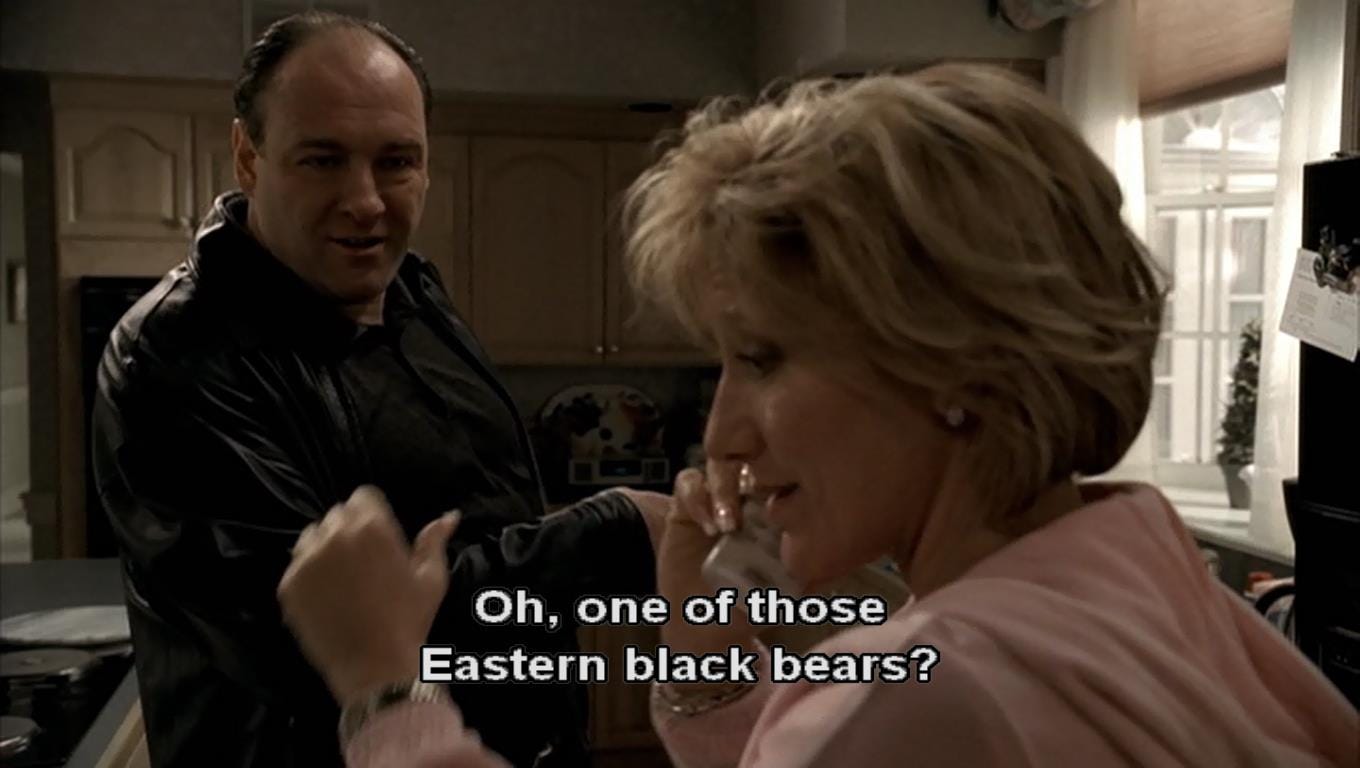
While I think season three is, on the whole, the best season of The Sopranos (even with “Christopher” and CGI Livia taken into consideration), season five is my personal favorite due to the strength of its commitment to being extremely weird and depressing. Right from the jump, the dynamic that intensified in season four — David Chase spitefully wrapping every moment of large-scale mob drama in seventeen layers of bizarre, intimate nonsense — starts to gel into something more cohesive.
Which is not to say this approach gets any less passive-aggressive in its execution. “Two Tonys” opens slowly, with a montage of the empty, autumnal Soprano home, and that montage leads us to Sunday dinner at Bobby and Janice’s marital home, where Bobby and Tony are watching TV news introduce three new characters who are due to be released from prison. (Tony yelling “OH” when Buscemi appears onscreen? A whole mood.) The report promises these men will generate all kinds of new chaos — and they do, eventually. But for now, we only actually meet one of them — Feech LaManna, the oldest and least influential, played by Robert Loggia — and all he really does is shoot the shit about how pubic hair trends changed while he was locked up.
Otherwise, the Family drama is limited to 1) the fallibility of Carmine’s aging body and 2) a feud between Christopher and Paulie over who’s responsible for picking up the tab for their group dinners. The latter is a receptacle for all kinds of other petty bullshit, and therefore it seems like the kind of conflict that will never burn itself out. But instead of setting up a season of arguments, their dispute gets wrapped up tidily by the end of the episode. Christopher and Paulie bicker behind the restaurant after Paulie runs up a tab he then saddles Christopher with, and their waiter comes outside to confront Christopher about what might be the world’s shittiest tip. Christopher throws something at the back of his head as he walks away, the waiter begins to have a seizure, and, after he and Christopher panic, Paulie kills him. It’s a quick and dirty reminder that, no matter how much these people might hate each other on an individual level, they’re bound together in this collective by their shared shittiness.
But that’s just the C plot. The A plot hinges on a bear menacing the Soprano home in an effort to satiate its bottomless desire to eat garbage. It’s the rare plotline that brings together almost every character, as they all have a lot of opinions about what should be done about the bear. (Sil’s earnest “If you’re ever chased by a bear, run downhill. For some reason, they can’t do that.” is god-tier.) And those opinions — delivered in the form of unsolicited advice — force Tony to do something about the problem.
The first solution he attempts is to offer Carmela a wad of cash so that she and AJ can stay in a hotel until the issue resolves itself. She declines; though she’s content to accept other cash for other purposes, she’s not wild about the combination of a material offering and a request to ignore a problem until it goes away. Since Carm refuses to vacate the home — and his colleagues refuse to stop harping on him for being a bad protector — Tony decides to secure it instead, outsourcing the labor to some random underlings before taking it upon himself.
You might think, given its ravenous appetite for trash, that the bear is supposed to be a proxy for the viewer. But it’s actually a proxy for Tony: an aggressive presence, lurking around spaces where he’s not welcome. The possibility that the bear is drawn to Tony’s cache of duck food (raised by a Fish and Game agent played by Gossip Girl’s own Bart Bass) gestures toward the man’s competing desires to menace his estranged wife and preserve his fragmented family. As Tony tells Melfi — our actual audience proxy, who bumps up against the outer limits of her curiosity about this charismatic, revolting man in a series of scenes that make me want to unzip my skin and crawl out of it — there are two Tony Sopranos. But it’s not the two he thinks; it’s not as simple as Flirtatious Tony and Mean Tony. There’s a Tony who relishes in creating problems, and a Tony who does everything in his power to avoid handling them. His concluding takeover of bear-watch duties suggests he’s willing to sacrifice the latter. But to become a singular, healthy, balanced Tony, he’d have to sacrifice both.

